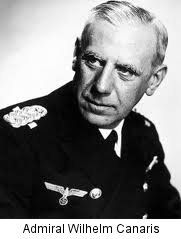Journal Volume 4 2004
Major Hermann Goertz and German World War 2 Intelligence Gathering in Ireland (continued/1)
When World War 2 broke out, the fact that Britain and Ireland were both islands posed great difficulty for German military intelligence with all the German secret agents sent to Britain landing from submarines, by parachute or infiltration from neutral countries.
Those agents dropped by parachute ran the risk of being killed or injured on landing and their radio sets damaged or lost. This happened not only to some German secret agents parachuted into Britain and Ireland but also to a number of Allied agents parachuted into Occupied Europe. Equally dangerous was landing by rubber dingy from a submarine as usually these took place under cover of darkness with all its attendant difficulties. Those trying to infiltrate Britain from neutral countries were subjected to the intense scrutiny that all arrivals from these countries were subjected to by the British authorities for the duration of World War 2 with the authorities in Ireland being equally vigilant.
It is fair to say that being a secret agent operating behind enemy lines is not the glamorous and exciting activity as portrayed in popular fiction, movies and TV, and is a view which those who were engaged in this activity during World War 2 totally disagree with.
Many people may not realise that prior to the outbreak of World War 2, some members of the German community resident in Ireland were engaged in considerable low level German espionage and intelligence gathering in Ireland and a full account of these activities is covered in David O’Donoghue's book “Hitler's Irish Voices” published in 1998 by Beyond the Pale Publishing, which is currently available through booksellers.
Initial Moves
German military intelligence gathering suffered from inter-service rivalries and internal politics to the extent that there was a great duplication and dilution of effort and resources. The Abwehr (German Military Intelligence) disliked the SS and S.D. intelligence services, considering them nothing more than bullyboys in uniform and non-professional in attitude and approach while the SS and S.D. considered the Abwehr as old fashioned and out of touch with reality and modern warfare intelligence gathering techniques.

In fairness, it must be said that the inter-service rivalry was not confined to the Germans as the British S.O.E. encountered difficulties and opposition from MI5 and the SIS with regard to operations and intelligence gathering in Occupied Europe. In Ireland, on a few occasions there was minor friction between Military Intelligence (G2) and the Garda Security Section (C3) but in the main both these organisations worked exceeding well during the Emergency in the discharge of their duties covering their respective areas of jurisdiction.
 Admiral Canaris, head of the Abwehr, held the view that the key to German sabotage and espionage operations in Great Britain was to be found in-Ireland while his colleague Major General Larhousen was keen to establish links with the IRA. after it began a bombing campaign in Britain from January 1939 onwards – the “S” Plan – in an attempt to force the British to leave Northern Ireland.
Admiral Canaris, head of the Abwehr, held the view that the key to German sabotage and espionage operations in Great Britain was to be found in-Ireland while his colleague Major General Larhousen was keen to establish links with the IRA. after it began a bombing campaign in Britain from January 1939 onwards – the “S” Plan – in an attempt to force the British to leave Northern Ireland.
Prior to the outbreak of World War 2, the Germans sent an individual called Oscar Pfaus to Ireland who made contact with Sean Russell, head of the IRA, and James O'Donovan, who had been IRA Director of Chemicals during the War of Independence and was the architect of the “S” Plan bombing campaign in Britain. On 3 occasions during 1939, O'Donovan, who was living in Shankill, Co. Dublin, travelled to Germany and had discussions with the Abwehr concerning the supply of arms and wireless sets to Ireland in the event of war breaking out between Germany and Britain. On his last visit to Germany in August 1939, the harsh treatment meted out to O'Donovan's wife by an overzealous German customs officer due to a simple misunderstanding, nearly led to the termination of the O'Donovan mission. It took a great deal of work by the Abwehr to calm down the O'Donovans who were prepared to return to Ireland immediately, but in the end the efforts of the Abwehr were successful and the O’Donovan mission continued.
Oscar Pfaus to Ireland who made contact with Sean Russell, head of the IRA, and James O'Donovan, who had been IRA Director of Chemicals during the War of Independence and was the architect of the “S” Plan bombing campaign in Britain. On 3 occasions during 1939, O'Donovan, who was living in Shankill, Co. Dublin, travelled to Germany and had discussions with the Abwehr concerning the supply of arms and wireless sets to Ireland in the event of war breaking out between Germany and Britain. On his last visit to Germany in August 1939, the harsh treatment meted out to O'Donovan's wife by an overzealous German customs officer due to a simple misunderstanding, nearly led to the termination of the O'Donovan mission. It took a great deal of work by the Abwehr to calm down the O'Donovans who were prepared to return to Ireland immediately, but in the end the efforts of the Abwehr were successful and the O’Donovan mission continued.
At that time, James O'Donovan was living in Florenceville, now called Millfield, off the Shanganagh Road on the Shankill side of Shanganagh bridge. Here a radio transmitter brought back from Germany was secretly installed and used on Sunday nights to send coded messages to Germany.


